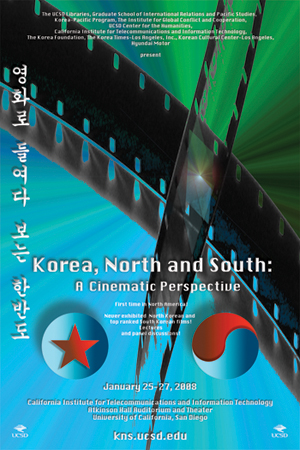Film Festival at Calit2 UCSD to Explore Diversity of Korea, North and South
San Diego, CA, December 17, 2007 -- Korea, North and South: A Cinematic Perspective , a Korean Film Festival/Symposium, will be presented Jan. 25-27 in the Calit2 complex at the University of California, San Diego. Screenings and lectures will be in the Calit2 Auditorium and Calit2 Theater of Atkinson Hall. All events are free and open to the public.
|
The three-day event is the first North American Korean film festival dedicated to films from the Republic of Korea (ROK), South, and the Democratic People’s Republic of Korea (DPRK), North. The films depict modern, contemporary Korean society, culture, and people on the divided Korean peninsula. In addition to the films there will be lectures and panel discussions by distinguished film directors, film producers, and scholars.
Special guests will be Minister Kim Myong Gil, DPRK Mission to the United Nations in New York City, and Ambassador Byung-hyo Choi, ROK Consul General in Los Angeles. Minister Kim Myong Gil is making his first visit to UC San Diego. Each will give brief remarks.
“The film festival comes at an auspicious time with the interesting developments on the Korean peninsula,” says Stephen Haggard, International Relations and Pacific Studies professor and festival facilitator, “including tentative progress on the nuclear issues and the North and South Korean summit which was held in October. The Korean peninsula is at a crossroads with the potential for much closer contact.”
“The fact that senior officials from both Koreas will be giving remarks at the festival reflects the desire of both governments to build on their common cultural identity to improve relations and reduce the risk of war,” says Susan Shirk, director of the UC Institute on Global Conflict and Cooperation (IGCC).
“The IGCC has been engaging North Koreans in our unofficial security forum called the Northeast Asia Cooperation Dialogue since 1993,” Shirk adds. “Our goal is to encourage North Korea to abandon its nuclear programs and establish normal relations with the U.S. and its neighbors so it can concentrate on developing its economy and improving the livelihood of its people.”
Cinematically and through lectures the festival will explore such questions as: How have the two Koreas evolved under completely different political and economic systems? And, are there underlying similarities in their societies that persist despite the differences in institutional arrangements?
Specifically, the festival will screen five North Korean films selected by North Koreans and considered as the most representative contemporary films produced in DPRK.
“One film, Blood-Stained Woodblock was made under the direct instruction of DPRK leader Kim Jong II,” says Jim Cheng, event director and head of the IR/PS Library/East Asia Collection, UCSD. “Another two movies, Hong Gil Dong and O My Love were produced under the direct influence or directed by the double defected/legendary South Korea film director, Sin Sang-ok, but without his name credited for the films.”
Hong Gil Dong, a story similar to that of Robin Hood, will screen at 9 a.m. Jan. 25 in Atkinson Auditorium. It will be followed at 10:45 a.m. by a lecture, Sin Sang-ok and His Films Made in the Democratic People’s Republic of Korea, by Princeton University professor, Steven Chung, in Atkinson Theater.
Welcoming remarks by UCSD Librarian Brian E. Schottlaender, Vice Chancellor and Dean of IR/PS Peter F. Cowhey, Ambassador Byung-hyo Choi, and Minister Kim Myong Gil will be given at 7 p.m. Jan. 25 in Atkinson Auditorium.
Blood-Stained Woodblock, a film about the protection of the golden Buddhist statue of Koryo from Japanese invaders, will screen at 9 a.m. Jan. 27 in Atkinson Auditorium. At 2 p.m. that afternoon, an open panel discussion, The North and South Collide – Korean Politics in Film, will be presented in Atkinson Theater. Haggard will chair the discussion which will include professors from the Korean National University, the University of Michigan, the University of Southern California, the University of California, Irvine, Princeton University, and UCSD.
O My Love, a romantic story between a person of humble birth and one of aristocracy, will screen at 7:15 p.m. Jan. 27 in Atkinson Auditorium.
“UCSD Libraries has spent more than two years to acquire and prepare the English subtitles for these five North Korean films for this event,” Cheng says. “These films are part of the library’s newly established Korean Film Collection, which has more than 100 North Korean films and 300 South Korean films.”
The South Koreans also will be represented in the festival by five films and one documentary film about the Koreans living in the USSR during World War II. These were selected by scholars from UCSD, USC, and UC Irvine.
“These are truly high level movies,” says Cheng. “Personally, I like To the Starry Island most. Its director Park Kwang Su will come from Korea to give a lecture and USC professor David James will lecture about Park’s films.”
To the Starry Island, a story about an old man in Seoul who asks a friend and his son to bury him on a distant island and the ensuing complications, will screen at 2:15 p.m. Jan. 26 in Atkinson Auditorium. Director Park Kwang-su will give a lecture entitled Where Winds Never Stop at 4:15 p.m. and James will follow with Park Kwang-su: Political Modernism.
For a complete listing of the films, lectures and discussions for the three day Korean film festival, go to http://kns.ucsd.edu.
UC San Diego is a national leader in promoting international studies. The Korea-Pacific Program of the Graduate School, IR/PS, and the Northeast Asia Cooperation Dialogue of the UC IGCC have contributed to official and non-official communication between the two Koreas and the world.
For further information contact event coordinator Maria R. Adams at (858) 534-1413, mradams@ucsd.edu or event director Cheng at (858) 534-7788, jicheng@ucsd.edu.
Related Links
Korea, North and South Website
Media Contacts
Media Contact: Jan Jennings, 858-822-1684, jnjennings@ucsd.edu


